The Intel 9th Gen Review: Core i9-9900K, Core i7-9700K and Core i5-9600K Tested
by Ian Cutress on October 19, 2018 9:00 AM EST- Posted in
- CPUs
- Intel
- Coffee Lake
- 14++
- Core 9th Gen
- Core-S
- i9-9900K
- i7-9700K
- i5-9600K
CPU Performance: Office Tests
The Office test suite is designed to focus around more industry standard tests that focus on office workflows, system meetings, some synthetics, but we also bundle compiler performance in with this section. For users that have to evaluate hardware in general, these are usually the benchmarks that most consider.
All of our benchmark results can also be found in our benchmark engine, Bench.
PCMark 10: Industry Standard System Profiler
Futuremark, now known as UL, has developed benchmarks that have become industry standards for around two decades. The latest complete system test suite is PCMark 10, upgrading over PCMark 8 with updated tests and more OpenCL invested into use cases such as video streaming.
PCMark splits its scores into about 14 different areas, including application startup, web, spreadsheets, photo editing, rendering, video conferencing, and physics. We post all of these numbers in our benchmark database, Bench, however the key metric for the review is the overall score.
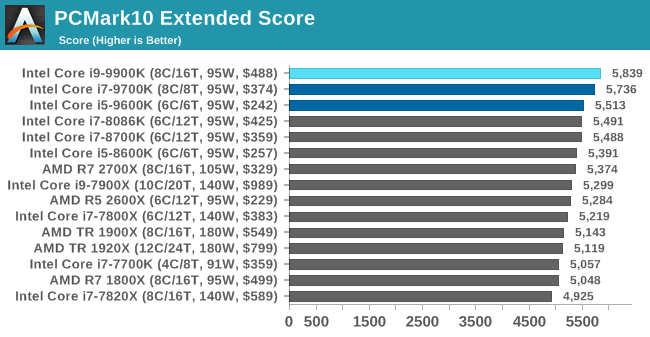
As a general mix of a lot of tests, the new processors from Intel take the top three spots, in order. Even the i5-9600K goes ahead of the i7-8086K.
Chromium Compile: Windows VC++ Compile of Chrome 56
A large number of AnandTech readers are software engineers, looking at how the hardware they use performs. While compiling a Linux kernel is ‘standard’ for the reviewers who often compile, our test is a little more varied – we are using the windows instructions to compile Chrome, specifically a Chrome 56 build from March 2017, as that was when we built the test. Google quite handily gives instructions on how to compile with Windows, along with a 400k file download for the repo.
In our test, using Google’s instructions, we use the MSVC compiler and ninja developer tools to manage the compile. As you may expect, the benchmark is variably threaded, with a mix of DRAM requirements that benefit from faster caches. Data procured in our test is the time taken for the compile, which we convert into compiles per day.
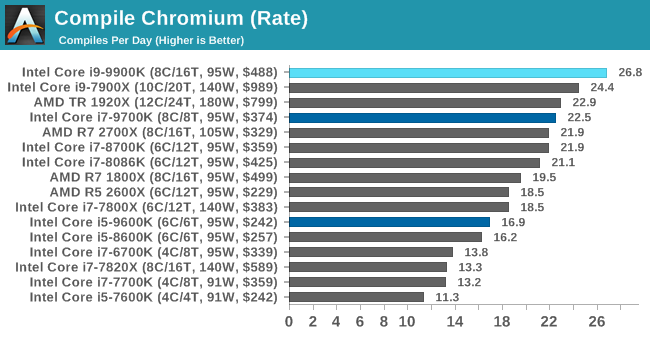
Pushing the raw frequency of the all-core turbo seems to work well in our compile test.
3DMark Physics: In-Game Physics Compute
Alongside PCMark is 3DMark, Futuremark’s (UL’s) gaming test suite. Each gaming tests consists of one or two GPU heavy scenes, along with a physics test that is indicative of when the test was written and the platform it is aimed at. The main overriding tests, in order of complexity, are Ice Storm, Cloud Gate, Sky Diver, Fire Strike, and Time Spy.
Some of the subtests offer variants, such as Ice Storm Unlimited, which is aimed at mobile platforms with an off-screen rendering, or Fire Strike Ultra which is aimed at high-end 4K systems with lots of the added features turned on. Time Spy also currently has an AVX-512 mode (which we may be using in the future).
For our tests, we report in Bench the results from every physics test, but for the sake of the review we keep it to the most demanding of each scene: Ice Storm Unlimited, Cloud Gate, Sky Diver, Fire Strike Ultra, and Time Spy.
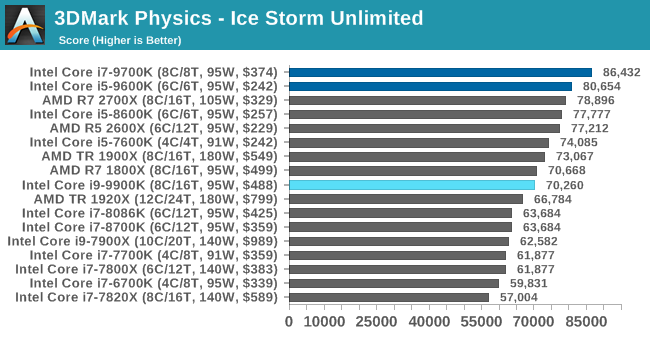
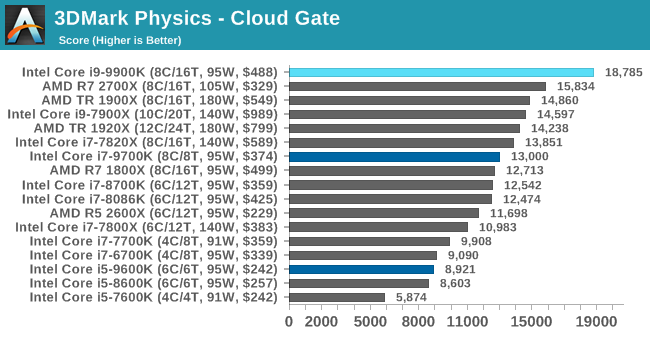
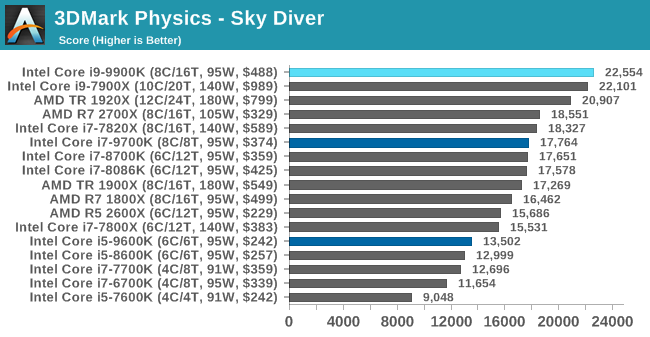
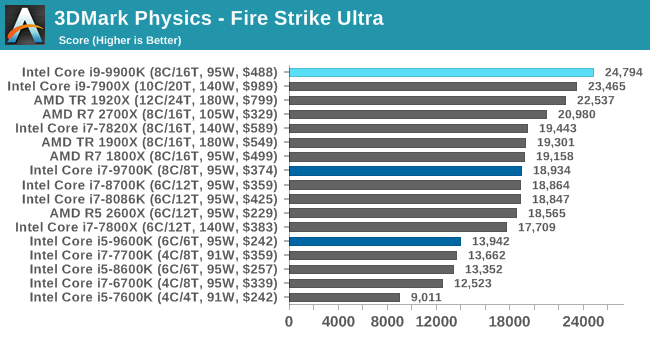
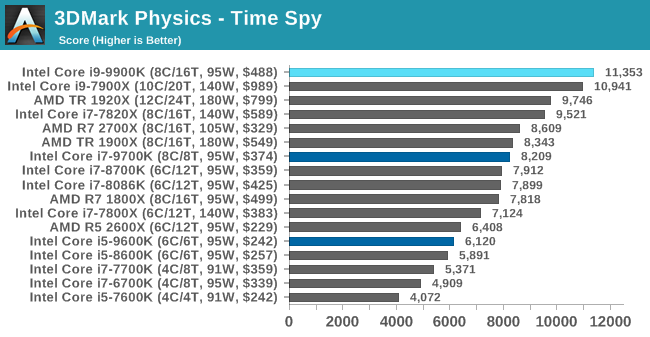
The older Ice Storm test didn't much like the Core i9-9900K, pushing it back behind the R7 1800X. For the more modern tests focused on PCs, the 9900K wins out. The lack of HT is hurting the other two parts.
GeekBench4: Synthetics
A common tool for cross-platform testing between mobile, PC, and Mac, GeekBench 4 is an ultimate exercise in synthetic testing across a range of algorithms looking for peak throughput. Tests include encryption, compression, fast Fourier transform, memory operations, n-body physics, matrix operations, histogram manipulation, and HTML parsing.
I’m including this test due to popular demand, although the results do come across as overly synthetic, and a lot of users often put a lot of weight behind the test due to the fact that it is compiled across different platforms (although with different compilers).
We record the main subtest scores (Crypto, Integer, Floating Point, Memory) in our benchmark database, but for the review we post the overall single and multi-threaded results.
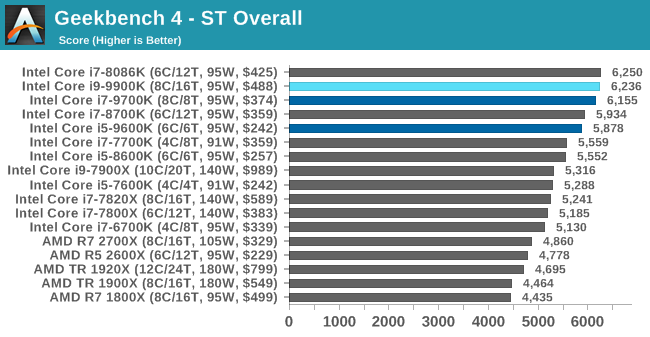
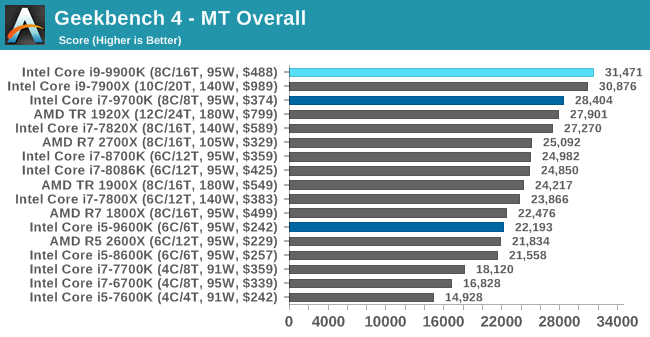










274 Comments
View All Comments
BloodyBunnySlippers - Friday, October 19, 2018 - link
The big take away for me: As resolution rises above 1080P, the performance differences narrows to almost nothing. And there is the Ryzen 5 2600x beating the 2700x (in gaming). I can get that at Micro Center for $190. That looks like a great performance/price ratio there.Achaios - Friday, October 19, 2018 - link
QUOTE So we are on Skylake Refresh Refresh Refresh UNQUOTEWake me up when they release new tech.
/thread
dan_ger - Friday, October 19, 2018 - link
It is just stupid to pay an extra $200 to have the best 1080p frame rates. What idiot buys an 9900k to game at 1080? Anyone with 1/2 a brain puts the extra $200 toward a better video card and plays at higher resolutions. The bottleneck here is the graphics card, not the cpu. A 2700x and a better graphic card is the best value.GreenReaper - Friday, October 19, 2018 - link
The idea with those tests is that they are trying to identify how the CPU performs in games when the video card is not a bottleneck, on the grounds that this may reflect performance after a future GPU upgrade.FlanK3r - Friday, October 19, 2018 - link
Ian, u forgot on graphs with Cinebench! :)Good review, as always. Glad you found same power consumption results as me (and not as many web magaiznes and bulshits in graphs :-) )
lefty2 - Friday, October 19, 2018 - link
Does anyone know why the Chrome compile results bounce around so much? In the original 2700x review the 2700x trounced the 8700k, but then those results were "corrected" and then the 8700k beat the 2700X (23.7 to 21.68). Now they are both at 21.9.Now, these new results show the 2700X and 8700K with same performance
zangheiv - Friday, October 19, 2018 - link
You have to be either be a total fanboy, or be fooled into buying this CPU. i9 9900K is made for the intel fanboys that are willing to pay a $300 premium for a soon to be obsolete part. It's definitely not a winner in the 'productivity' department since it's far better to go with a lower cost threadripper 1920X and have a tremendous upgrade path. Unless you have a high-end Crossfire or SLI setup for your GPUs and are playing older titles that have no interest in multi-core support, the i9 9900K is the choice, albeit a very idiotic one still. It's a desperate attempt by Intel catering to the desperate fan-club.eva02langley - Friday, October 19, 2018 - link
Review shall never used the MSRP, it shall use the street prices. It gives bogus sense of value.The street price is 580$.
mapesdhs - Sunday, October 21, 2018 - link
Almost $800 equivalent in the UK. 2700X costs 50% less even from the same seller.BOBOSTRUMF - Friday, October 19, 2018 - link
I would love that you retest the CPU with a 95 watt cooler as advertised by Intel :)